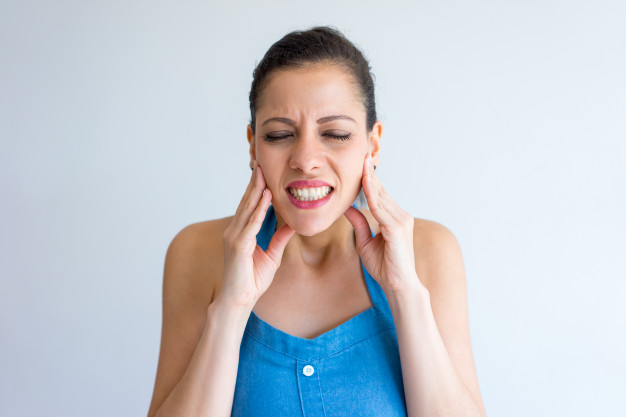Diagnosis and Treatment of
TMD-TMJ
Chronic Facial and Neck Pain
“Wonderful and personable, the staff here really care about each patient individually. I’ll never go anywhere else for my dental exam” ~Gretchen S.
Temporomandibular Disorder (TMD)
Millions of Americans suffer from chronic facial and neck pain as well as recurring headaches. In some cases, this pain is due to Temporomandibular Disorder, or TMD.
Your temporomandibular joints (TMJ) connect your lower jawbone to your skull. These joints get a lot of use throughout the day as you speak, chew, swallow, and yawn. Pain in and around these joints can be unpleasant and may even restrict movement.
Symptoms of TMD include:
Pain in the jaw area
Pain, ringing, or stuffiness in the ears
Frequent headaches or neck aches
Clicking or popping sound when the jaw moves
Swelling on the sides of the face
Muscle spasms in the jaw area
A change in the alignment of top and bottom teeth
Locked jaw or limited opening of the mouth
Schedule a Consultation
Smiles Are Our Specialty

Should you notice any of these symptoms, let your doctor know. Your dentist can help indicate the presence of TMD and create an effective treatment just for you.
There are a few simple steps you can take at home or work to prevent TMD from becoming more severe, or to prevent it from occurring:
Relax your face — remember the rule: "Lips together, teeth apart"
Avoid grinding your teeth
Avoid constant gum chewing
Don't cradle the phone receiver between your head and shoulder — either use a headset or hold the receiver in your hand
Chew food evenly on both sides of your mouth
Do not sit with your chin rested on your hand
Practice good posture — keep your head up, back straight, and shoulders squared
Understanding TMD: Relief for Jaw Pain and Dysfunction
If you’ve been dealing with persistent jaw pain, headaches, or difficulty chewing, you may be experiencing TMD—short for Temporomandibular Joint Disorder. This condition affects the joint that connects your jaw to your skull, known as the TMJ (temporomandibular joint). When this joint becomes misaligned, inflamed, or overworked, it can cause a range of painful and frustrating symptoms.
Common Symptoms of TMD
TMD symptoms vary from person to person, but often include:
- Jaw pain or soreness
- Clicking, popping, or grinding sounds when you open your mouth
- Difficulty chewing or speaking
- Headaches or neck pain
- Earaches or a feeling of fullness in the ears
- Locking of the jaw in an open or closed position
These symptoms can be mild or severe—and they often worsen with stress, poor posture, or habits like teeth grinding (bruxism).
What Causes TMD?
TMD can be caused by:
- Clenching or grinding your teeth
- Jaw injuries or trauma
- Arthritis in the jaw joint
- Misaligned teeth or bite issues
- Chronic stress leading to muscle tension
Understanding the root cause of your TMD is key to finding the right treatment.
How We Treat TMD
At our Savannah dental office, we provide custom care for patients struggling with TMD. Treatment options may include:
- A custom oral appliance or nightguard to reduce stress on the joint
- Bite adjustments to improve alignment
- Physical therapy or jaw exercises
- Relaxation techniques to reduce muscle tension
- In more complex cases, referrals for surgical evaluation
Find Relief Today
You don’t have to live with chronic jaw pain or discomfort. If you’re experiencing symptoms of TMD, schedule a consultation with our experienced dental team. We’ll evaluate your symptoms and create a personalized plan to relieve your pain and restore your jaw’s function—so you can get back to smiling, eating, and living comfortably.
“Wonderful and personable, the staff here really care about each patient individually.”
“Great practice and great people. Had a great first experience and thank you!”
“Doctor Friedman and his staff is always amazing! Everyone is friendly, caring, and has a great sense of humor.”
